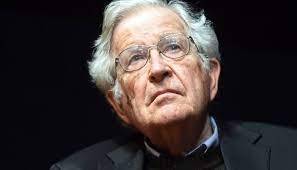Renowned philosopher, linguist and cognitive scientist Prof Noam Chomsky has said that for Pakistan to start a new journey on the right track, first of all, it has to get itself free from the clutches of colonial legacy and institutions.
Chomsky was speaking in the “PIDE debate” conversation with Dr Abdul Jalil, Prof of Economics at the Pakistan Institute of Development Economics (PIDE), Islamabad. The conversation between Prof Chomsky and Dr Jalil is part of the series of podcasts that PIDE regularly generates, with experts from around the world on various economic, governance, and public policy issues.
When asked about his views on the reasons behind Pakistan's sad state of affairs; on the economic front in particular, and where should be the starting point for Pakistan to reset with the current circumstances, Chomsky started by mentioning multiple factors: country-specific, impeding growth, pluralism, openness within the society, and of course, development.
“Pakistan, over the decades, has been pushed towards a certain type of religious orthodoxy that limits the growth of culture and rationality. In parallel, it is in constant conflict with India. So, these are the biggest roadblocks for Pakistan on the road to development. Nonetheless, these things are not only Pakistan-specific. The United States is also feeling the heat of religious extremism in recent years – very unusual for a western country. This phenomenon is also gradually squeezing the space for cultural and intellectual development in the US,” he said
Chomsky mentioned that Pakistan is in a complicated position, as it has one foot in China and the other in America/west. Still, it can move with a degree of independence.
However, Pakistan and India have to move towards a point of accommodation and constructive cooperation, and there is no other way. This may sound utopian now, but it may happen. It has happened in the past. Take, for instance, the case of France and Germany. Both, for centuries, massacred each other. Now both are cooperating, he said.
Chomsky believed that there is an inherent ambiguity when talking about intellectual honesty and responsibility. “First of all, we should know what our moral responsibility as human beings is. Secondly, what service is expected of them within the existing power systems? I would mention Henry Kissinger here. He clearly identified that a polity intellectual's role is to formulate the ideas of the powerful in a clear and applicable form. "In simple words, it means to be a stenographer for power,” he said.
“In contrast, there is a moral responsibility to be truthful and honest, certain values we should uphold, and so on. If you look at the history of intellectuals, almost all of them happened to be on the first side. They were in the chambers of power instead of being the critics. Those who had and have questioned have suffered and were dismissed to the margins,” enunciated Prof Chomsky.
Chomsky was speaking in the “PIDE debate” conversation with Dr Abdul Jalil, Prof of Economics at the Pakistan Institute of Development Economics (PIDE), Islamabad. The conversation between Prof Chomsky and Dr Jalil is part of the series of podcasts that PIDE regularly generates, with experts from around the world on various economic, governance, and public policy issues.
When asked about his views on the reasons behind Pakistan's sad state of affairs; on the economic front in particular, and where should be the starting point for Pakistan to reset with the current circumstances, Chomsky started by mentioning multiple factors: country-specific, impeding growth, pluralism, openness within the society, and of course, development.
“Pakistan, over the decades, has been pushed towards a certain type of religious orthodoxy that limits the growth of culture and rationality. In parallel, it is in constant conflict with India. So, these are the biggest roadblocks for Pakistan on the road to development. Nonetheless, these things are not only Pakistan-specific. The United States is also feeling the heat of religious extremism in recent years – very unusual for a western country. This phenomenon is also gradually squeezing the space for cultural and intellectual development in the US,” he said
Chomsky mentioned that Pakistan is in a complicated position, as it has one foot in China and the other in America/west. Still, it can move with a degree of independence.
However, Pakistan and India have to move towards a point of accommodation and constructive cooperation, and there is no other way. This may sound utopian now, but it may happen. It has happened in the past. Take, for instance, the case of France and Germany. Both, for centuries, massacred each other. Now both are cooperating, he said.
Chomsky believed that there is an inherent ambiguity when talking about intellectual honesty and responsibility. “First of all, we should know what our moral responsibility as human beings is. Secondly, what service is expected of them within the existing power systems? I would mention Henry Kissinger here. He clearly identified that a polity intellectual's role is to formulate the ideas of the powerful in a clear and applicable form. "In simple words, it means to be a stenographer for power,” he said.
“In contrast, there is a moral responsibility to be truthful and honest, certain values we should uphold, and so on. If you look at the history of intellectuals, almost all of them happened to be on the first side. They were in the chambers of power instead of being the critics. Those who had and have questioned have suffered and were dismissed to the margins,” enunciated Prof Chomsky.






